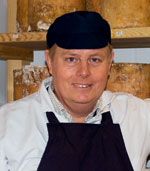Interview: Neal's Yard Dairy
Neal's Yard Dairy will be 30 next year, a milestone in Randolph Hodgson's crusade for British cheese


There are great baskets of British apples and homemade bread outside Neal’s Yard Dairy in London’s Covent Garden. Behind the windows are tiers of timpani-sized cheeses Stichelton, Cheddar invitingly arrayed.
The dairy will be 30 next year, a milestone in Randolph Hodgson’s crusade for British cheese. He will modestly deny this: ‘The real heroes were the farmhouse cheesemakers who stuck to their guns despite being told by the experts that they couldn’t sell. All we did was put the cheese in front of the public. When Appleby’s Cheshire was put on sale, the taste was a revelation.’ Mr Hodgson was brought up in Hong Kong the Chinese are notoriously unenthusiastic about cheese but he learned there that food should be fresh. ‘Our cook bought fresh food from the markets, just picked in the New Territories.’ Later, he went to school at Downside.
‘We visited Chewton Dairy to see the Cheddar making, and I was founder of the Down-side Cooking Society. But my only academic achievement was to get an A in chemistry.’ As a result, he went to London University to study chemistry and food science. Then came the revelation. ‘I read of someone saying “Why sell a chicken when you can sell water?” and, when I showed it to my group, they couldn’t see anything wrong with it.’ The move to Neal’s Yard was accidental. ‘It was a tumbledown banana warehouse started by Nicholas Saunders, an alternative capitalist, whose father was head of the LSE.’ First, there was a whole-food store, then a bakery, then the dairy.
‘I never thought it was more than a holiday job, and it still feels like that, not work at all.’ What made the dairy famous was Mr Hodgson’s selling technique letting customers sample the cheeses. ‘Two old biddies from Preston complained about the shop’s smell, so we asked them in and gave them cheese to taste, let them scratch the surface, and they really loved it.’
The binmen were given cheese as a Christmas tip, and the local police had a wholesale account. ‘So it’s not only toffee-nosed foodies we cater for.’ Today, Mr Hodgson advises and helps new cheesemakers, notably Tunworth, which saw Stacey Hedges and Julie Cheney go from novices to supreme champions in two years. ‘They were very, very receptive, willing to try things, and complementary personalities.’
It’s possible for the maker to get too involved, and Neal’s Yard helps with feedback. ‘Each batch of cheese is different, so the flavours change day-to-day. And taste is strange, very ethereal. If you can get it right, sales can go up by three times. It’s often not conscious, but subliminal.’ His litmus test is to put out plates of different cheeses and see which people go back to again and again. ‘I find that 18 out of 20 customers prefer the same cheese, but never 100%. We always get some customers the vindaloo brigade who want it stronger.
‘Taste also evolves: most of the staff here New Zealanders, Australians, Poles begin with no expertise. They generally start with the easy-to-like ones, such as Montgomery’s Cheddar, then they work up to those with more depth. It’s like your first sip of beer who enjoyed that?’ Retailers, he adds, needs to know the English character. ‘They always underestimate our capacity to appreciate flavour because we don’t comment.
Sign up for the Country Life Newsletter
Exquisite houses, the beauty of Nature, and how to get the most from your life, straight to your inbox.
You give customers a cheese to taste and they’ll say “Oh, that’s nice”. Then you give them a second and they’ll say “That’s really nice”. They haven’t actually liked the first at all. You have to listen.’ He’s fairly satisfied about the progress of the British love affair with cheese. ‘It’s not there yet, but it’s going in the right direction. We need more technical advisers who understand farmhouse cheesemaking.’
He hopes soon to set up a small farmhouse cheesemaker in conjunction with Wensleydale Creameries in Hawes. ‘They’re working on a more traditional recipe for us. I’m excited by the idea.’ This year, there were 900 cheeses at the British Cheese Awards. ‘But we haven’t overtaken France. There are 7,000 farmhouse cheesemakers there. We have 200. But we’ve halted the decline and found a market for new cheesemakers.’ I said he was modest.
Country Life is unlike any other magazine: the only glossy weekly on the newsstand and the only magazine that has been guest-edited by HRH The King not once, but twice. It is a celebration of modern rural life and all its diverse joys and pleasures — that was first published in Queen Victoria's Diamond Jubilee year. Our eclectic mixture of witty and informative content — from the most up-to-date property news and commentary and a coveted glimpse inside some of the UK's best houses and gardens, to gardening, the arts and interior design, written by experts in their field — still cannot be found in print or online, anywhere else.
-
 380 acres and 90 bedrooms on the £25m private island being sold by one of Britain's top music producers
380 acres and 90 bedrooms on the £25m private island being sold by one of Britain's top music producersStormzy, Rihanna and the Rolling Stones are just a part of the story at Osea Island, a dot on the map in the seas off Essex.
By Lotte Brundle
-
 'A delicious chance to step back in time and bask in the best of Britain': An insider's guide to The Season
'A delicious chance to step back in time and bask in the best of Britain': An insider's guide to The SeasonHere's how to navigate this summer's top events in style, from those who know best.
By Madeleine Silver